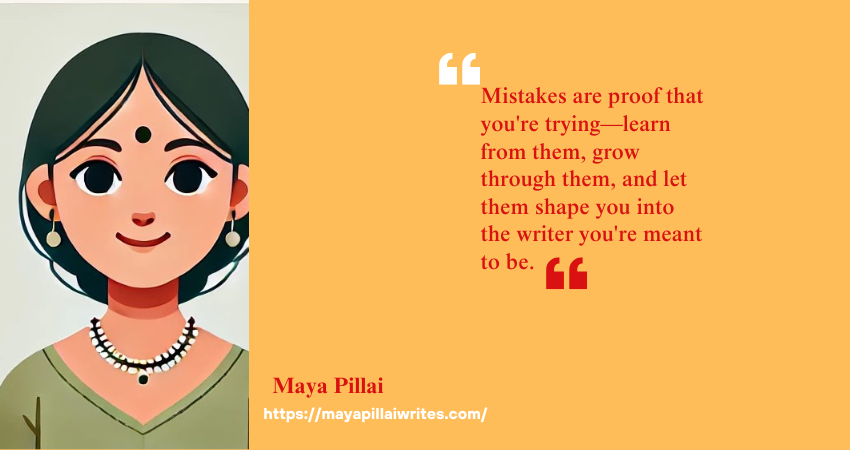10 Mistakes Freelance Writers Make

Let’s be honest—freelance writing can feel like a juggling act. Between finding clients, meeting deadlines, and producing top-notch work, it’s easy to slip up. Whether it’s undervaluing your time or rushing through edits, every writer makes mistakes. But here’s the thing: those mistakes aren’t career-ending. They’re opportunities to learn and grow. If you’ve ever felt stuck or frustrated in your freelance writing journey, you’re not alone. Let’s unpack 10 common mistakes freelance writers make and how you can avoid them. 1. Saying Yes to Every Project Freelance writers often feel pressured to say “yes” to every opportunity, especially when starting out. But taking on every project can leave you overwhelmed, overworked, and, frankly, uninspired. Not every job will align with your skills or interests, and that’s okay. The solution? Take a step back and evaluate each opportunity. Does the project excite you? Does it pay fairly? If not, it’s better to politely decline than to burn out on work that doesn’t fulfill you. 2. Undercharging for Your Work Many freelance writers struggle with pricing their services. It’s tempting to lowball your rates to land a client, but that often backfires. Charging too little not only undervalues your expertise but can also leave you stressed about making ends meet. Instead, research what other writers in your niche charge and confidently set rates that reflect your skills. Remember, your time and talent are worth it. 3. Miscommunicating with Clients Clear communication is the backbone of any successful project. Without it, misunderstandings can crop up, leaving both you and your client frustrated. It’s easy to assume you know what the client wants, but assumptions often lead to mistakes. Always ask questions, clarify details, and provide updates throughout the project. Clients appreciate writers who take the time to get things right. 4. Missing Deadlines We’ve all been there—biting off more than we can chew and scrambling to finish on time. Missing deadlines, though, can harm your reputation and damage client trust. To avoid this, get real about how long a project will take. Use tools like Google Calendar to keep track of deadlines and break the work into manageable chunks. And if life throws you a curveball? Communicate with your client right away. They’ll value your honesty. 5. Skipping the Editing Phase You’ve just finished a draft, and the temptation to hit “send” is strong. But skipping the editing phase is one of the biggest mistakes a freelance writer can make. Even small typos can leave a bad impression. Make editing non-negotiable. Take a short break before revisiting your draft with fresh eyes, and use tools like Grammarly or Hemingway to catch errors. The extra effort goes a long way. 6. Avoiding Self-Promotion If promoting yourself feels awkward, you’re not alone. Many writers hesitate to market their skills, relying instead on job boards or word-of-mouth. But avoiding self-promotion limits your growth. A strong online presence—like a polished LinkedIn profile or a personal website—can showcase your expertise and attract the right clients. You don’t need to brag; just share your work and let it speak for itself. 7. Forgetting to Use Contracts Skipping contracts might save time upfront, but it can lead to headaches later. Without clear terms, you risk payment issues, scope creep, or even losing control of your work. Protect yourself and your clients by always using a simple contract. It doesn’t need to be fancy—just outline what you’re delivering, when, and for how much. 8. Trying to Be a Jack-of-All-Trades Many freelance writers try to cover every topic under the sun, thinking it will make them more marketable. But being a generalist often makes it harder to stand out. Clients look for specialists who understand their industry. Find a niche you’re passionate about—whether it’s tech, travel, or parenting content—and focus on building your expertise there. You’ll not only attract better-paying clients but also enjoy the work more. 9. Taking Feedback Personally Let’s face it—receiving feedback can sting. Writing is personal, and criticism can feel like a direct attack on your skills. But taking feedback personally only holds you back. Instead, view it as an opportunity to improve. Ask yourself, “What can I learn from this?” Applying constructive feedback helps you grow and build stronger client relationships. 10. Neglecting Professional Growth Freelance writing isn’t a “set it and forget it” career. Trends evolve, and clients expect writers to keep up. If you’re not actively improving your skills, you risk falling behind. Dedicate time to learning, whether it’s through online courses, books, or webinars. Staying curious and adaptable ensures you stay competitive in the industry. To Wrap Up Mistakes are a natural part of any journey, and freelance writing is no exception. What matters most is how you respond to them. By recognizing these common pitfalls and taking proactive steps to avoid them, you’ll set yourself up for long-term success. Remember, it’s okay to make mistakes—they’re opportunities to learn, grow, and become an even better writer. So, which mistake will you tackle first? Looking for a writer who can bring your brand’s voice to life? I’d love to help. Let’s talk about your project and create content that works as hard as you do!
Content Writing vs. Copywriting: Understanding the Differences and Opportunities

As a writer, I’ve often found myself caught between content writing and copywriting. At first, they felt like two sides of the same coin—just words on a page, right? But then I noticed how some words made people feel informed and inspired, while others had them ready to click that “Buy Now” button. If you’ve ever wondered why that is, you’re not alone. Content writing vs copywriting serve very different purposes, yet both are essential in today’s digital landscape. Let’s dive into what makes each unique—and how understanding the difference could unlock new opportunities for you or your business. What is Content Writing? Content writing is about creating informative and engaging content meant to educate, entertain, or inspire readers. The primary goal is to provide value and build a long-term relationship with an audience. Content writing vs copywriting can take many forms, including: Blog posts Articles Social media content E-books and whitepapers How-to guides and tutorials Good content writing focuses on quality, relevance, and delivering information that resonates with the audience. It often incorporates SEO (Search Engine Optimization) practices to improve visibility and drive organic traffic to a website. The tone of content writing can vary, but it generally leans towards being informative, engaging, and authentic. Example of Content Writing: A blog post titled “10 Tips for Writing Engaging Instagram Captions” offers practical tips and strategies to help readers enhance their social media game. What is Copywriting? Copywriting, on the other hand, is about persuasion. It aims to get readers to take immediate action, such as making a purchase, signing up for a newsletter, or clicking a link. It’s short, punchy, and emotionally compelling, often found in: Ad copy Sales pages Email marketing campaigns Product descriptions Landing pages Copywriters are experts at crafting words that sell. They understand human psychology and how to trigger emotions to influence behavior. Unlike content writing, which educates or entertains, copywriting is purely results-driven. Example of Copywriting: An email subject line that reads, “Unlock 20% Off Your First Order—Today Only!” encourages readers to take advantage of a limited-time offer. Key Differences Between Content Writing and Copywriting Purpose: Content writing informs, educates, or engages to build trust and brand authority over time. Copywriting persuades and drives readers to take immediate action, like making a purchase or signing up. Tone and Style: Content writing is generally longer and more informative, with a focus on delivering value. Copywriting is concise, punchy, and emotionally engaging. SEO and Marketing: Content writers often work on SEO strategies to improve a website’s organic search ranking. Copywriters focus on creating high-converting text for ads, landing pages, and email campaigns. Audience Engagement: Content writing aims for engagement and interaction over the long term. Copywriting seeks to provoke an immediate response from the audience. Opportunities for Writers Understanding the differences between content writing vs copywriting opens up diverse opportunities for writers. Here’s how: Diversify Your Skills: Mastering both disciplines can make you a more versatile writer, able to take on a wider range of projects. Increased Earning Potential: Copywriting, especially, is a lucrative skill due to its direct impact on sales and conversions. Many businesses are willing to invest heavily in persuasive copy that drives results. Work with a Variety of Clients: Content writing can lead to long-term gigs, while copywriting often brings high-value, short-term projects. Both can be rewarding in their own ways. Explore Different Industries: From tech startups to lifestyle brands, both writing types are needed across various sectors, giving writers endless possibilities to explore their interests. Opportunities for Businesses For businesses, understanding these differences can help allocate resources more effectively. If the goal is brand awareness and education, invest in content writing. A well-written blog strategy or thought leadership article can drive consistent traffic and establish authority in your niche. If the aim is to boost sales or lead generation, focus on copywriting. Compelling ad campaigns and landing pages with a clear call-to-action (CTA) are critical for converting leads into customers. To Wrap Up Both content writing and copywriting are powerful tools in the digital landscape, but they serve different roles. While content writing builds trust and long-term relationships, copywriting drives action and sales. By understanding these nuances, writers can refine their craft, and businesses can harness the power of words more effectively. Whether you’re a writer seeking to expand your portfolio or a business owner deciding on your marketing strategy, recognizing the strengths of each type can lead to better outcomes. So, which one will you focus on next?. Ready to Make Your Words Work for You? The insights shared in this article are only the tip of the iceberg when it comes to mastering the art of content writing vs copywriting. As a writer or business owner, you might be searching for that secret formula that makes words stick—whether your aim is to engage, educate, or drive sales. Maybe you’ve been struggling to distinguish between content that builds long-term trust and copy that drives immediate action. Or perhaps you’re unsure which approach will best serve your brand’s goals and connect with your audience on a deeper level. Here’s the good news: You’re in the right place to unpack the power of words and how they can transform your brand presence. Content writing vs copywriting isn’t just a choice; it’s a strategic decision that can: Build meaningful relationships with readers who find value in what you share. Compel prospects to take action, whether that means subscribing, purchasing, or joining your community. Elevate your brand by blending information with emotion, making your message memorable. Whether you want to use content to establish authority or persuasive copy to boost conversions, understanding both is crucial. Ready to level up your communication game and get your words to work harder for you? Let’s craft writing that doesn’t just inform but engages, persuades, and drives results. Get in touch, and together, we’ll ensure your content or copy hits the mark every time.
